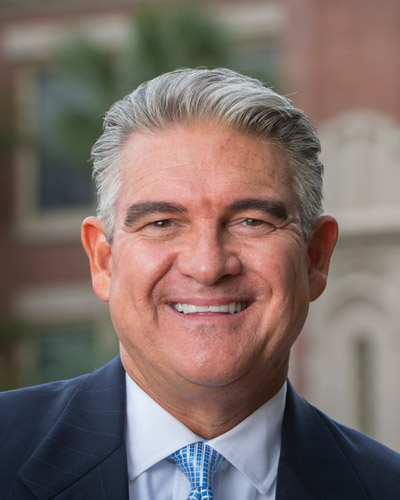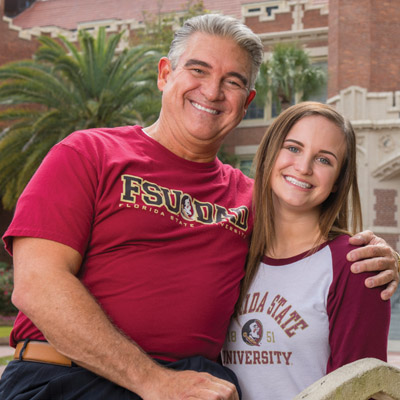Fighting an epidemic

For nearly a decade, Tony Ruscella has served at the forefront of the nation’s efforts to battle opioid addiction. His entry into the field coincided with the second wave of this epidemic, as early efforts to decrease opioid prescriptions made the drugs harder to get and users turned to illicit suppliers. But his journey to this point doesn’t begin where you’d expect.
“When I first came to Florida State University, I had criminology in my crosshairs — the intrigue of finding out ‘who done it’ was appealing,” Ruscella said.
The Nokomis, Florida, native fell hard for Tallahassee in 1981, when he visited as a Boys State delegate, lodging at FSU and learning about leadership, government and community engagement. He returned to the tree-shaded, red-brick charm of the university’s campus as a student the next year and graduated with a degree in computer and information science in 1987.
The 1980s were a revolutionary time in the world of computer science: Bill Gates and Steve Jobs were competing for supremacy in the digital realm, and computers were beginning to be mass-produced for personal use. The university, through the Supercomputer Computational Research Institute and the support of the Department of Energy, was able to install the first supercomputer in the region, giving students an amazing view into the future of computing.
Beyond the tech assets, the program was heavily grounded in math, statistics, analytical skills and problem-solving, a key contributor to Ruscella’s switch to a computer science major during his sophomore year.
“The computer science program helped me by preparing me to analyze data, work on models, make predictions and use statistical logic to apply math skills,” Ruscella said. “That has made me a sought-after commodity in the job market. I can take large amounts of data and synthesize it to produce predictions and analyses.”
From FSU to the pharmaceutical industry
After graduating in 1987, Ruscella took a position with Whitehall Laboratories, the OTC pharmaceutical arm of American Home Products, a large corporation whose holdings also included Wyeth Laboratories. After six years and four promotions working in sales in the over-the-counter drug division, Ruscella left for a position with G.D. Searle, a research-based pharmaceutical company that makes and markets prescription pharmaceuticals and other healthcare products.
“There’s less science involved in OTC product sales,” Ruscella said. “I was intrigued more by the medical science involved in prescription products.”
Ruscella worked for Searle for six years, promoting products such as Celebrex and Daypro (anti-inflammatory drugs), Calan SR (a blood pressure medication) and Ambien (a sedative often used to treat insomnia)
A pivot into substance-abuse treatment
He left in 2003 to enter his current field, that of substance abuse treatment, as a regional manager and business manager for the southeastern United States for British multinational corporation Reckitt Benckiser, which patented Suboxone, a drug used to treat opioid addiction.
“I used my FSU training to work on statistical models to figure future sales forecasting for Reckitt’s vice president,” Ruscella said. “It helped me make very accurate estimates, and that helped put me on the map with the folks at headquarters in England.”
In 2010, Ruscella departed Reckitt Benckiser to take up a new endeavor in the field of substance abuse treatment, where Reckitt’s former VP was now a CEO with a Florida-based national chain of opioid treatment programs.
“I left the pharmaceutical product industry to go into the service side with Colonial Management Group, based in Orlando,” he said. “Colonial was then the second-largest provider of outpatient opioid treatment using the medically assisted treatment model, with about 60 facilities nationwide at that time.”
Ruscella was able to learn from his former VP colleague and mentor, now a CEO, about the field of substance abuse treatment services.
As the third-wave of the opioid crisis emerged in 2013, with an upswing in deaths resulting from illegally manufactured fentanyl, Ruscella went to work for CRC Health Group, which was later acquired by Acadia HealthCare. Acadia is currently the largest provider of such services nationwide, with 127 facilities treating more than 62,000 patients a day. As vice president of business development, Ruscella is responsible for opening new facilities around the country in the best places possible for outpatient treatment using the medically assisted treatment model. He also serves as co-president of the Ohio Association for the Treatment of Opioid Dependence.
Working to expand access to treatment
His experience fighting the country’s opioid epidemic has fueled Ruscella’s passion for expanding access to treatment for patients suffering from substance abuse disorders and opioid dependence. He recently traveled to Tallahassee to meet with legislators, the Governor’s office and Florida Department of Children and Families Secretary Chad Poppell.
“Many of the rules and regulations regarding substance abuse treatment are outdated,” Ruscella said. “A lot of states seek industry experts’ assistance in rewriting those rules and regulations to expand access to treatment.”
As a result of Ruscella’s meetings and the collaborative efforts of other vendors and the DCF, a new needs assessment survey should be published this summer, which will allow the state to expand treatment via a licensure process.

The next generation
For Tony and Aleena Ruscella, choosing to attend Florida State University was a case of “Like father, like daughter.”
Ruscella brought his daughter, then a freshman at a Tampa high school, to the 2014 FSU-Notre Dame football game at Doak Campbell Stadium. Aleena fell in love with the campus and city and, today, she’s set to embark on her sophomore year at FSU studying criminology.

